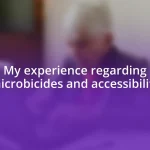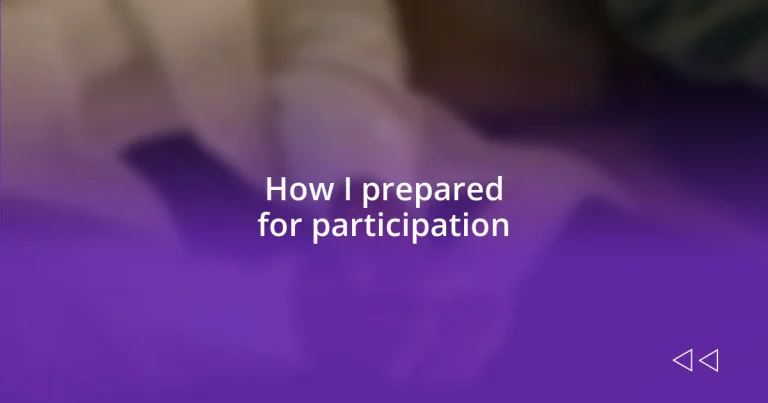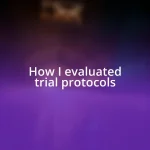Key takeaways:
- Understanding participation requirements and seeking clarity boosts confidence and prepares individuals for events.
- Setting specific, measurable, and achievable preparation goals creates a structured roadmap, enhancing motivation and performance.
- Engaging in feedback sessions and regularly reviewing progress fosters growth and readiness, transforming the preparation process into a supportive experience.
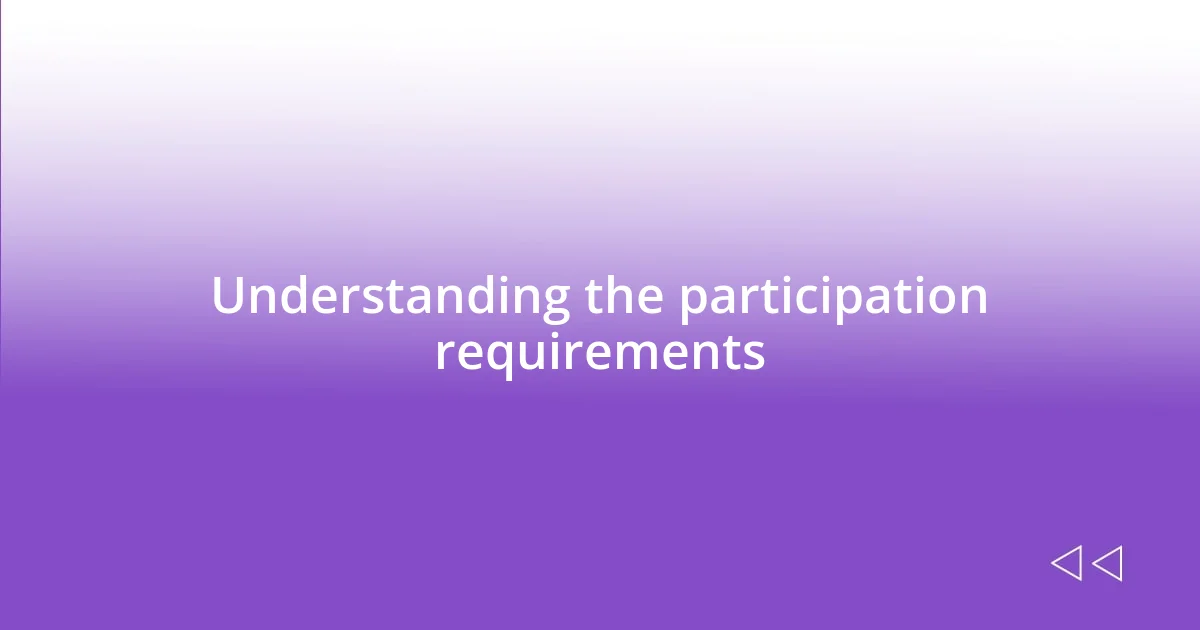
Understanding the participation requirements
Understanding the participation requirements can feel overwhelming at first, but it’s essential for feeling prepared. I remember when I signed up for my first event, the details seemed almost cryptic. How much time would I need to commit? Would I be expected to have prior experience? These questions swirled in my mind, and I realized that seeking clarity was the first step to building my confidence.
As I delved deeper into the requirements, I discovered nuances that really shaped my approach. For instance, some events had specific eligibility criteria that I hadn’t initially considered. I learned that being proactive about these details—like asking organizers for clarification—was key. Have you ever missed out on something simply because you didn’t fully understand what was needed? I certainly have, and it taught me to dig deeper and really understand the landscape.
While researching, I also found that participation often comes with quirky yet important guidelines. Some activities required gear, while others hinged on a commitment to teamwork. I felt a mix of excitement and anxiety thinking about it! Remembering the way team dynamics can shift based on these requirements helped me appreciate the larger picture and motivated me to prepare fully. Engaging fully in every aspect was crucial, and I believe it’s that holistic understanding that paved the way for my successful experience.
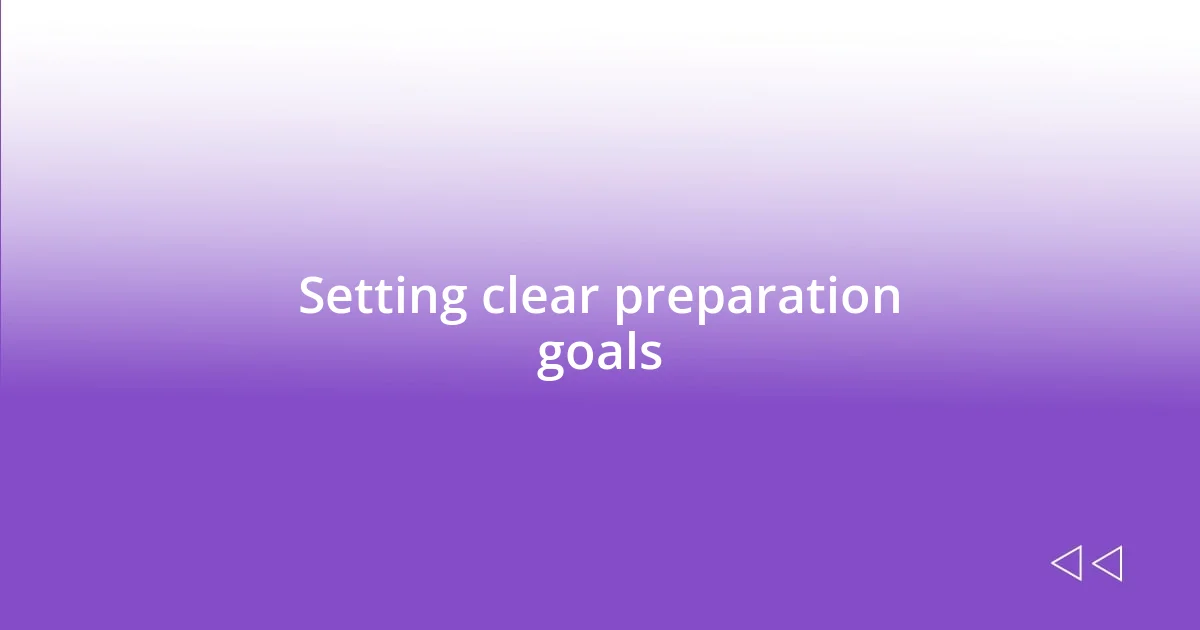
Setting clear preparation goals
Setting clear preparation goals is a game-changer. When I first committed to participating in an activity, I was all over the place—unsure of what I needed to achieve. I found that defining specific, measurable goals helped channel my energy in the right direction. For example, rather than just saying I wanted to “prepare better,” I set a goal to read up on key strategies for at least 30 minutes every day. This shift from vague aspirations to concrete targets transformed my preparation entirely.
One critical insight I gained during my preparation journey was the importance of balance. Initially, I was tempted to over-prepare, thinking that doing more would equal better results. However, this often led to burnout. Instead, I focused on establishing milestones, like practicing a skill once a week or reviewing materials related to the event every couple of days. I quickly realized that achieving smaller, attainable goals kept my motivation high, allowing me to enjoy the process. Have you ever felt overwhelmed by the expectations you set for yourself? I certainly have, and it was through this experience that I learned to set realistic goals aligned with my capacity.
Ultimately, setting clear preparation goals isn’t just about ticking boxes; it’s about creating a roadmap that guides you through the journey. One goal I remember setting was to connect with past participants to gather insights. Making that connection not only provided valuable information but also boosted my confidence. Reaching out to others can create a sense of community, which greatly enhances one’s preparation experience. Isn’t it comforting to know you’re not alone in this?
| Goal Type | Description |
|---|---|
| Specific | Define clear targets (e.g. “Read three articles”) |
| Measurable | Ensure you can track your progress (e.g. “Track weekly practice hours”) |
| Attainable | Set realistic goals based on your current abilities (e.g. “Practice skills twice a week”) |
| Relevant | Align goals with your overall objectives (e.g. “Focus on teamwork strategies”) |
| Time-Bound | Set deadlines for each goal to create a sense of urgency (e.g. “Complete reading by next Friday”) |
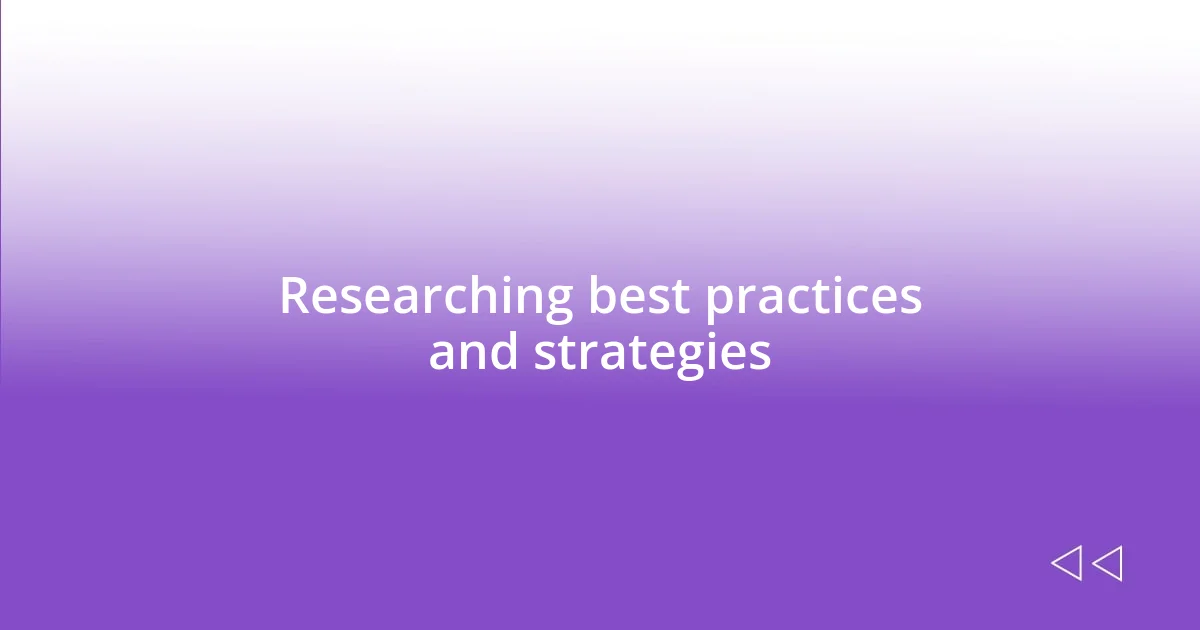
Researching best practices and strategies
Researching best practices and strategies opened up a whole new world for me. I found that tapping into the experiences of others helped me feel more grounded. There’s something empowering about learning from those who have walked the same path. One strategy that worked wonders for me was diving into online forums or communities. I remember reading someone’s story about how dedicating a few hours each week to skill assessment not only boosted their confidence but also enhanced their actual performance. It hit home for me: sometimes, it’s the simplest adjustments that lead to significant improvements in preparation.
When I set out to research, I discovered several strategies that became my guiding light. Here are some best practices that I believe can truly enhance your preparation:
- Seek Diverse Sources: Explore a variety of articles, videos, and podcasts to gather diverse perspectives.
- Engage with Peers: Connecting with fellow participants provides insights that you might not find in writing.
- Document Your Findings: Keep a preparation journal to track what you learn and reflect on your progress.
- Visualize Your Goals: Picture where you want to be and outline the steps to get there; visualization can boost motivation.
- Test and Reflect: Don’t just research; actively apply what you learn and evaluate its impact on your preparation.
These insights not only helped me clarify my approach but also eased my anxiety about the unknown. In one instance, I stumbled upon a blog post detailing a participant’s experience, which transformed my mindset from trepidation to excitement. Knowing that others had navigated similar challenges made my journey feel less daunting and more like an adventure. The beauty of preparation lies in uncovering tools and strategies that resonate personally, all while knowing I’m heading into something meaningful and fulfilling.
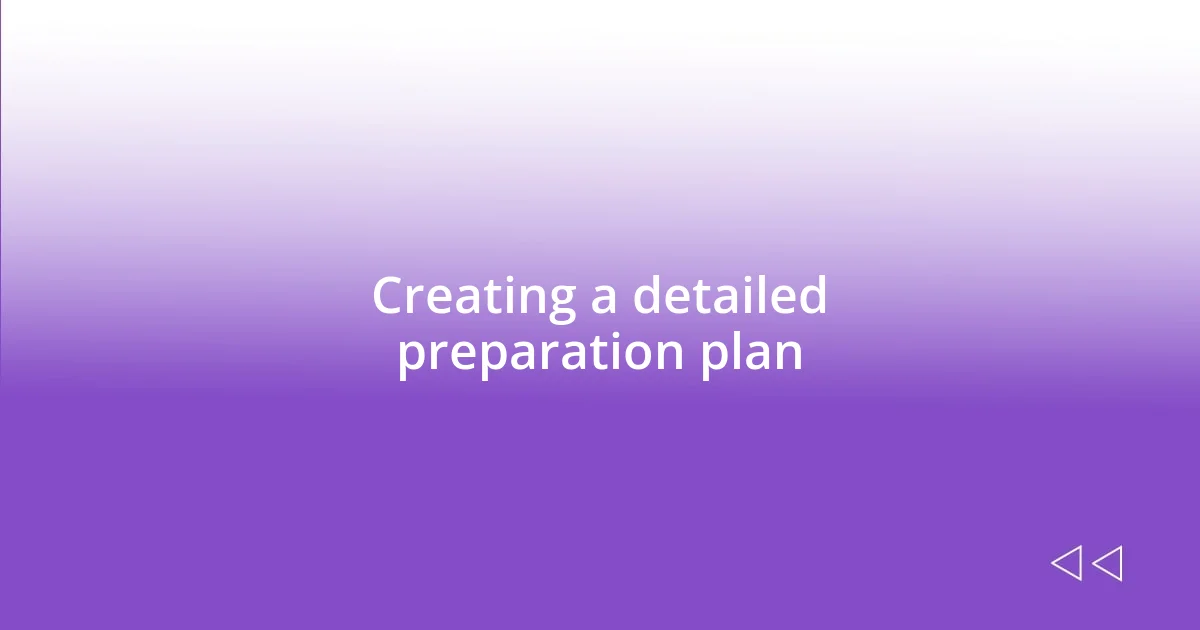
Creating a detailed preparation plan
Creating a detailed preparation plan is crucial in transforming your aspirations into actionable steps. I remember sitting down one afternoon with a notebook, feeling a mixture of excitement and nervousness. I started mapping out each aspect I needed to consider—schedule, resources, and checkpoints. This exercise quickly made the daunting task ahead feel manageable. Have you ever tried mapping out a plan and found clarity in the chaos? It’s a bit like turning on a light in a dim room; suddenly, you can see where to go next.
As I crafted my plan, I tailored it to my unique style, laying out weekly objectives alongside daily tasks. Initially, I wasn’t sure how to prioritize what needed my attention the most. I learned that breaking down my major goals into smaller, focused tasks made a world of difference. For instance, instead of blurring my efforts into ‘prepare for everything,’ I tackled one specific area daily, like honing my presentation skills or reviewing pertinent literature. This structure kept me energized rather than overwhelmed. Have you ever found that a structured approach made a complex goal feel more achievable? It truly does.
Reflecting on the progress I made while sticking to my preparation plan was enlightening. I often noted how each little win contributed to a growing sense of confidence. There were moments I felt unmotivated, but looking back at my checklist gave me a boost. I could see just how far I’d come. I think there’s something incredibly satisfying about being able to say, “I did that,” as you check off completed tasks. Don’t underestimate the power of a well-structured plan—it’s like having a supportive friend cheering you on through the process!
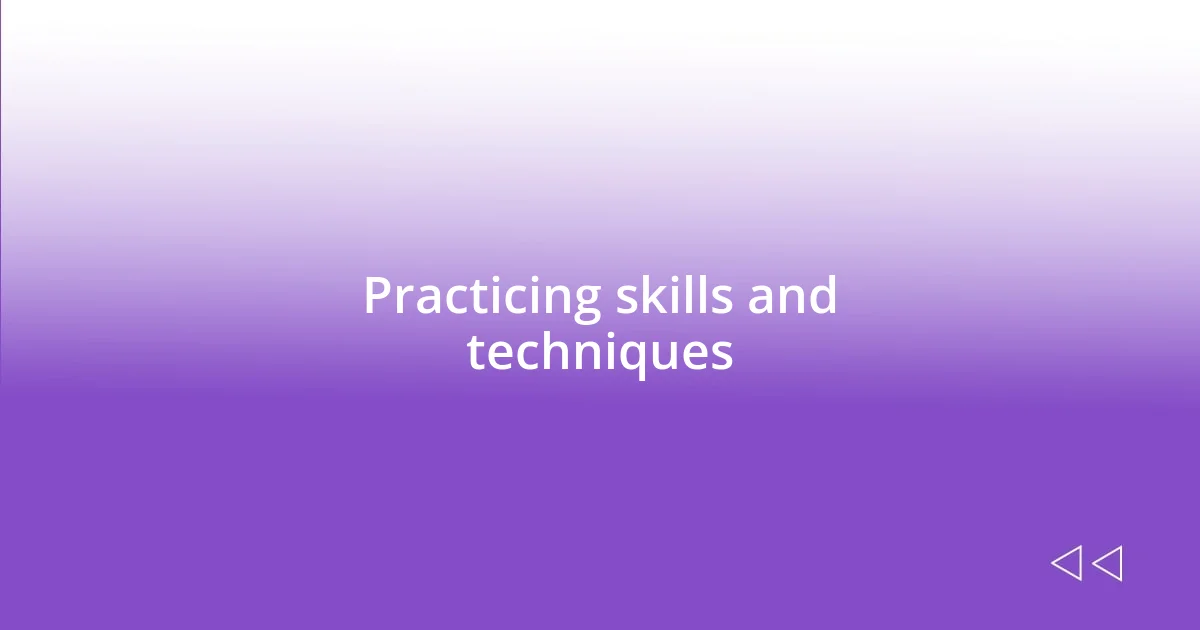
Practicing skills and techniques
Practicing specific skills and techniques can truly transform your level of performance. I remember when I first dived into practicing these skills; I was both nervous and excited. It felt like stepping onto a tightrope for the first time. Would I wobble? Would I fall? But I quickly learned that breakdowns help build confidence. I started with short, focused practice sessions, dedicating just 20 minutes to techniques that challenged me. That time flew by, and I found myself improving rapidly. This method of consistent, bite-sized practice might feel small, but believe me, it makes a big difference.
As I explored different techniques, I found that engaging with visual aids played a crucial role. For example, I created flashcards that highlighted key concepts and practiced techniques while referring to them. On some days, I went through my flashcards like a game, trying to beat my previous time. It introduced an element of fun into the routine. Have you ever watched yourself improve and felt that rush of excitement? It’s such a validating experience. When I nailed a technique that had previously eluded me, there was a moment where I thought, “Wow, I really didn’t think I could do that!”
Reflecting on how I practiced, I also started recording myself. Playback was illuminating. It felt a bit strange at first, but I realized that hearing my own voice gave me insights I could have never gathered otherwise. Sometimes, I could barely believe how far I had come after re-listening to my earlier recordings. It offered a snapshot of my growth and allowed me to pinpoint areas needing further refinement. Have you ever seen your own progress laid out so starkly that it sparked renewed determination? For me, the audible journey became as vital as the practice itself, reinforcing the idea that with persistence, improvement isn’t just a possibility—it’s a guarantee.
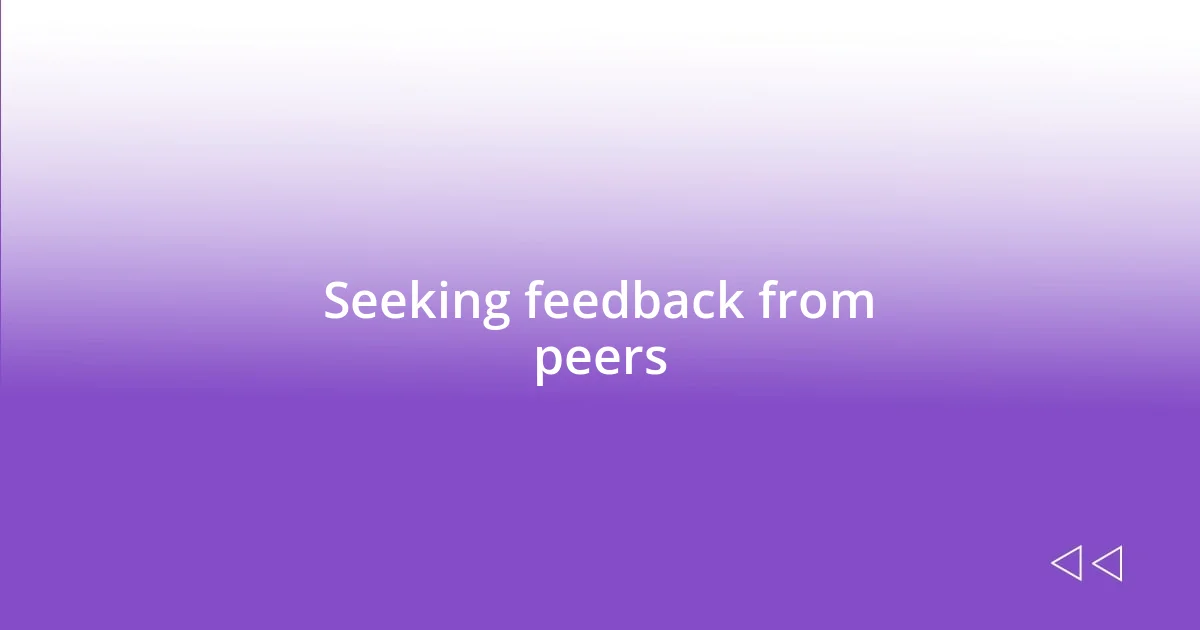
Seeking feedback from peers
When I started seeking feedback from my peers, I was honestly a bit apprehensive. It felt like opening a window and inviting a storm inside, but I soon realized how valuable their insights could be. I remember sharing my presentation draft with a close friend who wasn’t afraid to be honest. Her comments felt tough to hear initially, but reflecting on them helped me see my work from a fresh perspective. Isn’t it fascinating how someone outside your thought process can illuminate areas you might overlook?
Engaging in feedback sessions turned into a productive routine for me. I’d often invite a small group to review my progress, creating a safe space for discussions. The difference was astounding. One afternoon, I presented a concept I was convinced was perfect, but a peer raised a valid concern about its clarity. I was surprised to find that once I addressed that feedback, my entire approach felt sharper and more focused. Have you ever felt a shift in understanding just by talking through your ideas with someone else? It’s incredibly empowering.
As I continued to seek feedback, I discovered the importance of asking specific questions. Instead of a vague “What do you think?”, I began to request their thoughts on particular sections. I’ll never forget the moment when one of my classmates highlighted a section that resonated with them. It made me realize how our experiences shape our perceptions, and their enthusiasm was contagious. Have you ever experienced a similar moment where feedback unlocked a new level of excitement in your work? For me, that connection reaffirmed that feedback isn’t just criticism; it’s a collaborative journey toward growth.
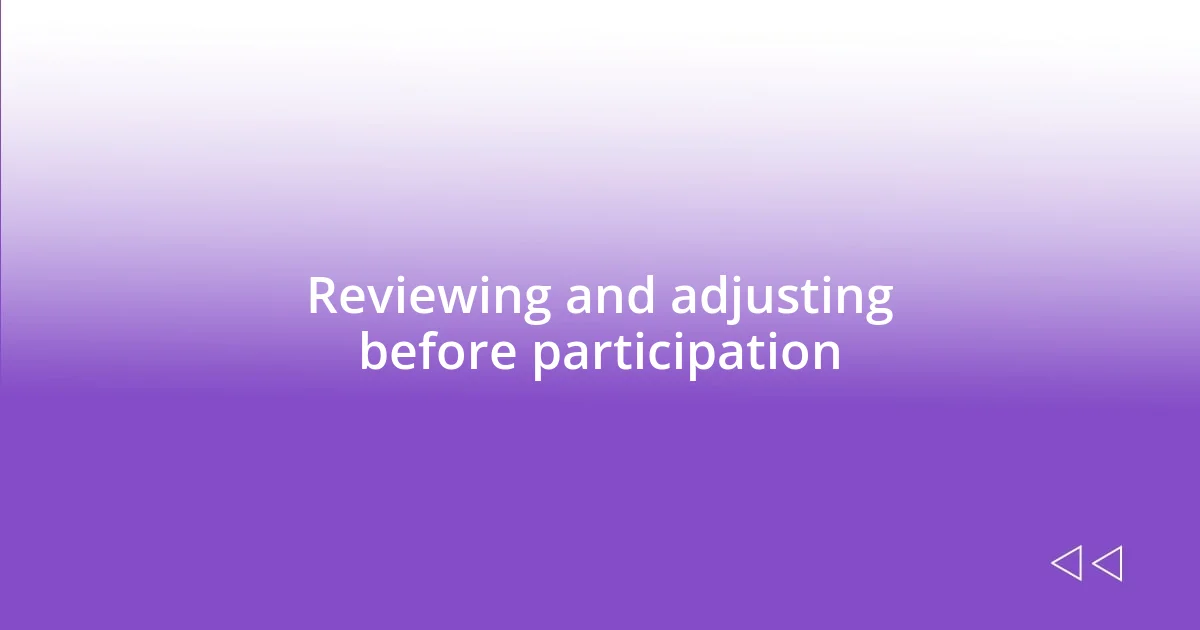
Reviewing and adjusting before participation
When I got to the point of reviewing my approach before participation, I found it invaluable to step back and assess what I’d accomplished. It felt like peeking at a puzzle to see which pieces fit together and which ones were still missing. I remember sitting down one afternoon with a cup of tea, flipping through my notes, and asking myself, “What truly worked for me, and what didn’t?” This self-reflection not only highlighted my strengths but also illuminated areas where I could make adjustments.
I embraced the idea of tweaking my strategies based on my reflections. For instance, after examining my practice sessions, I realized that I was spending too much time on areas I was already comfortable with. It was like polishing a shiny car while neglecting a flat tire! A simple shift in focus helped me channel my energy into the more challenging aspects I needed to improve. Have you ever had that lightbulb moment where you realize that a minor change could lead to substantial growth? For me, this adjustment was often the breakthrough I didn’t even know I needed.
As the day of participation approached, I made it a habit to review my goals and progress regularly. I set specific checkpoints, which felt like mini-exams for myself. Each time I said, “Okay, where do I stand?” it provided clarity and accountability. One night, while re-evaluating my performance alongside a friend, we both laughed at how far we had come since the beginning. We knew that our honest reviews were not just a process but also a bond that fueled our confidence. Isn’t it interesting how sharing your journey can amplify motivation and ignite a powerful sense of camaraderie? For me, that realization made the preparation feel less daunting and much more rewarding.


